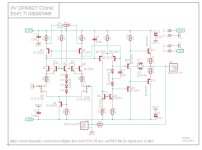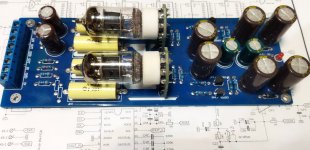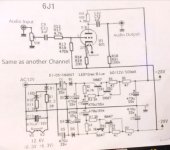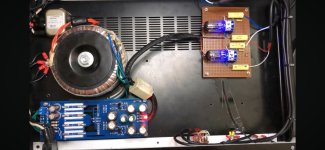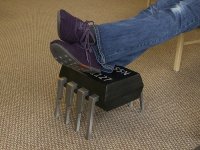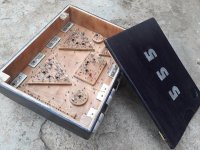I have a 10 yo picture of a dac amp i boxed in a 1.5 l réd wine wood box, but I do notremember where it is, ahaha. Did you know in Venetia territory you have mor than 120 différents wines for the chikities after à working day ?¡ 😍 😎
(Said from a french it is a f....g compliment ! 🙂 *)
*: and yes, I know also the wines of the others italian areras ! 😉
(Said from a french it is a f....g compliment ! 🙂 *)
*: and yes, I know also the wines of the others italian areras ! 😉
Last edited:
https://www.ebay.com/itm/272202079852Like very much the tidy build of @NIXIE62 , perhaps would ask him a link to the enclosure?
Just be careful, that box is small for any Miro DAC. There are some deeper boxes like that one. AD1862 can fit there, for example.
Last edited:
What's Nutube?Designing a AD1865 with Nutube I/V, it will be a very interesting little dac 🙂 That chip really is worth the effort to explore.
@NIXIE62 what I need is a small box for stacked PS+ MIRO Ad1866, amanero USB and Power transformer, something that I can use at the office without bringing wine boxes and tube stages in it 🙏😁
NuTube by KORG
Not sure it would be better than good double triode tube but very compact. Very microphonic, they need to be mounted carefully.
Not sure it would be better than good double triode tube but very compact. Very microphonic, they need to be mounted carefully.
@rehanabid
Another potential board to try in future would be Miro's i2s to PCM with reclock....
https://www.diyaudio.com/community/...s-input-nos-r-2r.354078/page-455#post-7755211
I am getting excited over this project , hopefully it will be a success by Miro.
I have played with the EPM240 module a bit, initially @miro1360 helped with the program i.e 2 I2S inputs and 1 out with a momentary switch to toggle between the two, later I expanded it to include a small I2C display.
The conversion from I2S to PCM is pretty good, I think in some cases better than the logic gates. reclocking is a new one lets see, with miro's project sharing record so far I am confident that it will be a suceess.
Try the tube IV stage. The AD1865R very good with it.
Thanks, I know my last attempt didnt go successful because the tubes arrived in pieces of glass, and the customs, the courier company and the insurer shifted blame to each other and never paid up after that deiced not to venture into this territory.
However, next time I am in states or canada or UK will ensure ordering a few beforehand which I could bring back myself.
Yes that one 🙂 Very compact, low voltage, no heat. Microphonics are easy to handle, i made an adapter.NuTube by KORG
Not sure it would be better than good double triode tube but very compact. Very microphonic, they need to be mounted carefully.
I was taking a look at ad1862 and ad1865 datasheets today, funny how this is all I found about psrr:
So, I suppose they are fairly insensitive to psu noise, are there any findings about it in this thread?
Thanks,
Alex
No figures given, only the hint above. If a special psu was required to achieve "ultralow noise 20-bit performance" then I would expect more info about it in the datasheet.As with most linear circuits, changes in the power supplies will affect the output of the dac. Analog Devices recommends that well regulated power supplies with less than 1% ripple be incorporated into the design of an audio system.
So, I suppose they are fairly insensitive to psu noise, are there any findings about it in this thread?
Thanks,
Alex
Hello,
If someone wants to try the cen iv, I'm selling mines - ready to plug in the dip8 socket with batteries (2x 5x 18650) + switch + 2 wondom modules + transformer to charge the batteries. You can use them at least 300h before charging. Sj74 ans sk170 coming from ebay seller punkydawgs, riv are y-foil resistors.
Regards



If someone wants to try the cen iv, I'm selling mines - ready to plug in the dip8 socket with batteries (2x 5x 18650) + switch + 2 wondom modules + transformer to charge the batteries. You can use them at least 300h before charging. Sj74 ans sk170 coming from ebay seller punkydawgs, riv are y-foil resistors.
Regards
Hi guys
which one do you prefer?
AD1862 with tube
AD1865 with tube
PCM63 and PCM58 boys 😉 cracking DACs, not the last word in detail but massive sound. No idea where the PCM58 gets the extra bass. Both stunning with Dark IV and the Soviet tube tech.
Today I finally managed to build the discrete OPA627 clone op-amps published here by @miro1360 ages ago. He was very kind in revising the layout for me to make them smaller.
So despite the most painstakingly careful assembly and matching of transistors, both boards have issues. One has DC offset of -3V and gets hot, pulling lots of current and heating the transformer., the other no measurable output at all.
Miro if you can remember, what does the trimmer set, is is current across 0.22Rs? And how critical is C2 10pF? I have 47pF in the boards, forgot to get 10pF.
Gerber files and schematic below, there is a second pair here if a clever person wants to try and figure these out as they could be worth developing into small SMD format mounted to DIP holders. R13 1K5 is IV resistor and should be omitted to use as normal op-amp.
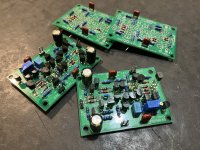
Attachments
That looks like a Musical Fidelity X-10D Buffer clone board.
If it is, no voltage gain in that circuit.
If it is, no voltage gain in that circuit.
The regulator is a current source, and there isn't a follower (quite high output impedance)... 🤔
This will certainly NOT be a neutral sounding thing
This will certainly NOT be a neutral sounding thing
Early in my programming career I worked for a start-up that made IBM compatible mainframes. The chief engineer there liked riddles. For example, "When is a clock not a clock?" "When is passes through combinatorial logic." The idea being, the logic gates destroy the integrity of the clock.CPLD for very low jitter with I2S inputs selector and selectable PCM output with Stop-Clock and ReClock function in progress
In addition to damaging the clock signal, Stop-Clock introduces significant Fs noise into the system.
- Home
- Source & Line
- Digital Line Level
- DAC AD1862: Almost THT, I2S input, NOS, R-2R
